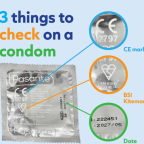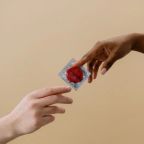Gonorrhoea
Gonorrhoea is a bacterial infection which can infect the urethra (the tube which you use to pass urine/wee), the womb, the rectum and can be passed to the throat or eyes.
It’s passed on through unprotected sex (without a condom).
Here we will discuss the signs and symptoms of gonorrhoea, as well as, how to get tested and treated.
Gonorrhoea
Gonorrhoea is a bacterial infection which can infect the urethra (the tube which you use to pass urine/wee), the womb, the rectum and can be passed to the throat or eyes.
It’s passed on through unprotected sex (without a condom).
Here we will discuss the signs and symptoms of gonorrhoea, as well as, how to get tested and treated.
Signs and Symptoms
Some people may not show any signs of infection, with 10% of born male and 50% of born females showing no symptoms.
If you do show symptoms, they may include:
- A thick green or yellow discharge from the vagina or penis
- Pain when peeing
- In women, bleeding between periods
How is it Transmitted?
Gonorrhoea can easily be spread through unprotected sex or just by being in contact with infected genital fluids (semen or vaginal fluid).
Here are some of the ways you can get it:
- Unprotected vaginal, anal or oral sex
- Sharing unwashed sex toys
The bacteria can sometimes infect the entrance to the womb, the urethra (the tube you use to pee), the rectum, the throat and the eyes.
How to Get Tested
The free, easy and discreet way to discover if you have an STI.
Call our Helpline
Speak to a friendly advisor and get the advice and support you need.
You’re not alone.
There are people who care about you and want to help you through this.
Prevention
You can prevent the spread of and yourself contracting gonorrhoea by:
- Using a condom every time you have vaginal or anal sex
- Using a condom to cover the penis during oral sex
- Using a dam (a piece of thin, soft plastic or latex) to cover the female genitals during oral sex or when rubbing female genitals together
- Avoid sharing sex toys without washing in-between uses
Treatment
Don’t worry, you can get gonorrhoea treated through an antibiotic injection into the thigh or bum – with most symptoms improving after just a few days.
It’s usually recommended that you have a follow-up appointment a week after your treatment.
FAQs
Gonorrhoea
Clear answers to common questions
Contacting a sexual health service for the first time may be a little daunting, especially if you’re not keen on talking to someone. So, here are answers to some of the questions we get asked a lot.
Is gonorrhoea serious?
Usually, the infection isn’t serious if you get treated quick enough. However, if you leave it untreated for a long time it can lead to complications including infertility.
Where can I get tested?
You can test yourself at home. To order a test click here. For information on how to take a test visit our resource hub.
Can I have sex during treatment?
You shouldn’t have sex until you, and your partner, have finished treatment. This will help stop you from getting the infection again and passing it on to anyone else.









